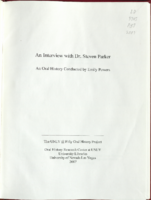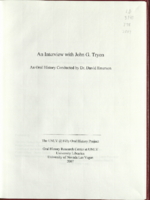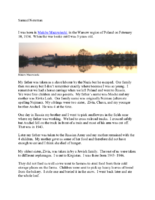Search the Special Collections and Archives Portal
Search Results
Grace Hayes Papers
Identifier
Abstract
The Grace Hayes Papers (1900-1989) include personal papers and financial papers pertaining to the Grace Hayes Lodge (formerly the Red Rooster), a nightclub on the Strip in Las Vegas, Nevada. The collection includes financial documents, newspaper clippings about Hayes and her family, personal correspondence, career mementos, legal documents, and photograph albums.
Archival Collection
Elizabeth Harrington Collection of Essays
Identifier
Abstract
This collection contains the original drafts of the thirteen essays that Elizabeth Harrington wrote about her life in early Las Vegas, Nevada. These articles were written from her memory and experiences of life in Las Vegas beginning in the early 1900s, and were published in the Nevadan section of the Las Vegas Review-Journal from 1975-1979.
Archival Collection
Ladies Auxiliary to the Veterans of Foreign Wars Collection
Identifier
Abstract
The Ladies Auxiliary to the Veterans of Foreign Wars Collection (1951-1977) contains publicity books, scrapbooks, community service records, newspaper clippings, correspondence, photographs, and newsletters pertaining primarily to the Fred S. Pennington post no. 1753 Ladies Auxiliary to the Veterans of Foreign Wars of Las Vegas, Nevada and the associated local chapter of the American War Mothers organization. The Ladies Auxiliary and the American War Mothers are non-profit organizations that assist in providing support and services to veterans and active service members. This material was formerly known as the Luanna Mitchell Collection.
Archival Collection
C. Vern Olmstead Professional Papers
Identifier
Abstract
The C. Vern Olmstead Professional Papers (1940-1975) contain materials related to Olmstead’s work as a prominent meat industry executive. The collection pertains to the preparation, cutting, storage, marketing, and distribution of meats including beef, pork, and poultry. Materials include reports, correspondence, newspaper and magazine clippings, photographic prints and slides, and publications regarding topics relevant to the handling and sale of meat in the United States and Canada.
Archival Collection
Ronnow Family Photographs
Identifier
Abstract
The Ronnow Family Photographs contain four black-and-white photographic prints of the Ronnow family in Southern Nevada from approximately 1870 to 1950. Also included is one large oversized black-and-white photographic print of the Old Rotary Club with C. C. Ronnow present.
Archival Collection

Interview with Linda (Mack) Smith, October 6, 2006
Date
Archival Collection
Description
Text

Transcript of interview with Dr. Steven Parker by Emily Powers, December 19, 2006
Date
Archival Collection
Description
Text

Transcript of interview with John G. Tryon by Dr. David Emerson, February 21, 2006
Date
Archival Collection
Description
Text

Biographical essay by Samuel Newman, 2014
Date
Archival Collection
Description
Samuel Newman describes his experience during the Holocaust and being separated from his siblings at different orphanages. He was in Kyrgyzstan from 1943 to 1946, and at an orphanage in Poland until 1951. Newman trained in graphic arts and spent some time in the military in Israel. He came to the United States in 1968.
Text
Audio clip from interview with Glenn Tredwell, March 4, 2016 and April 14, 2016
Date
Archival Collection
Description
In this clip, Glenn Tredwell discusses how he came to Las Vegas, Nevada in 1975.
Sound
